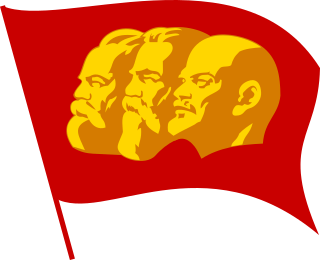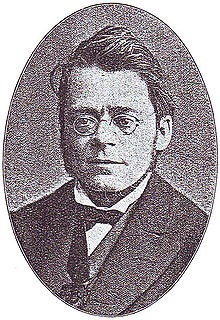The Promotion A(Doctor of an academic field) was an academic qualification in the DDR. It was introduced in the 3rd higher education reform with the "Regulation of academic grades" of 6 November 1968 and was governed by the doctoral ordinance of 21 January 1969. The qualification required the production of a dissertation. While the faculties of universities and tertiary institutes in West Germany each had their own doctoral and habilitation regulations, all doctorates in the DDR were governed by the Promotion A regulations. The award of the promotion was granted to the academic councils of the tertiary institutions. At the same time, the Promotion B (Doctor of Science) was introduced in imitation of the Soviet model, in order to replace the Habilitation.

East Germany, officially the German Democratic Republic, was a country that existed from 1949 to 1990, when the eastern portion of Germany was part of the Eastern Bloc during the Cold War. It described itself as a socialist "workers' and peasants' state", and the territory was administered and occupied by Soviet forces at the end of World War II — the Soviet Occupation Zone of the Potsdam Agreement, bounded on the east by the Oder–Neisse line. The Soviet zone surrounded West Berlin but did not include it; as a result, West Berlin remained outside the jurisdiction of the GDR.

West Germany was the informal name for the Federal Republic of Germany from 1949 to 1990, a period referred to by historians as the Bonn Republic, an era when the western portion of Germany was part of the Western bloc during the Cold War. It was created during the Allied occupation of Germany in 1949 after World War II, established from eleven states formed in the three Allied zones of occupation held by the United States, the United Kingdom and France. Its capital was the city of Bonn.
Habilitation defines the qualification to conduct self-contained university teaching and is the key for access to a professorship in many European countries. Despite all changes implemented in the European higher education systems during the Bologna Process, it is the highest qualification level issued through the process of a university examination and remains a core concept of scientific careers in these countries.
Contents
In the DDR, special degrees and training programmes were created systematically and on demand in order to control academically inclined youth. The requirements for the Promotion A were the possession of an academic degree from a university or tertiary institute of the DDR, systematic knowledge of the theoretical underpinnings of the chosen subject and of Marxism–Leninism, as well as "active participation in the development of the socialist society." [1] The Promotion A was achieved through work as a Wissenschaftlicher Assistent, Forschungsstudium and the ordinary or extraordinary Aspirantur . Work as an assistant at a DDR tertiary institution was professional employment, which was usually combined with further study and, as a rule, was limited to four years. The Forschungsstudium, by contrast, was devoted entirely to study and usually lasted three years. It was devoted exclusively to preparation for the doctorate and was linked to a stipend. The academic Aspirantur was introduced in 1951 as part of the second education reform. As a postgraduate degree it was intended mainly to meet the need for officers qualified in economics. The ordinary Aspirantur lasted three years and placed a stipend at the benefit of the student in order to free them from the need for employment. In a single year a partial Aspirantur with stipend could be granted to a student or officer for the accelerated completion of a dissertation.

In political science, Marxism–Leninism was the official state ideology of the Soviet Union (USSR), of the parties of the Communist International, after Bolshevisation; and is the ideology of Stalinist political parties. As revolutionary politics, the purpose of Marxism–Leninism is the transformation of a capitalist state into a socialist state, by way of two-stage revolution, which is led by a vanguard party of professional revolutionaries, drawn from the proletariat. To realise the two-stage transformation of the state, the vanguard party establishes the dictatorship of the proletariat, which determines policy through democratic centralism.
Wissenschaftlicher Assistent, often shortened to Assistent, literally "scientific assistant", usually translated as assistant professor in English, was formerly an academic position at German universities for researchers with doctoral degrees and additional academic qualifications, who were typically employed to conduct research to qualify themselves for the Habilitation and thus a full Professorship. The position was abolished in 2005 and replaced with the title Juniorprofessor. Like professors, the position formed part of the pay grade (Besoldungsordnung) C of the higher civil service, with a rank within the civil service equal to major in the military.
A stipend is a regular fixed sum of money paid for services or to defray expenses, such as for scholarship, internship, or apprenticeship. It is often distinct from an income or a salary because it does not necessarily represent payment for work performed; instead it represents a payment that enables somebody to be exempt partly or wholly from waged or salaried employment in order to undertake a role that is normally unpaid or voluntary, or which cannot be measured in terms of a task .
After a positive assessment of the dissertation and a successful thesis defense (which could be waived), the candidate received the Promotion A. The dissertation was assessed not only on subject-based criteria but on "its theoretical substance and its social value." [2] This was judged on the basis of its assumed value for practice and its contribution to the further development of Marxism–Leninism. This often meant that doctoral candidates, even in medicine and natural sciences, had to include chapters on Marxism–Leninism in their dissertations. Results which contradicted the official doctrines of the DDR were sometimes suppressed. At any rate, dissertations were not published and a few copies were generally accessible only in university libraries.

Medicine is the science and practice of establishing the diagnosis, prognosis, treatment, and prevention of disease. Medicine encompasses a variety of health care practices evolved to maintain and restore health by the prevention and treatment of illness. Contemporary medicine applies biomedical sciences, biomedical research, genetics, and medical technology to diagnose, treat, and prevent injury and disease, typically through pharmaceuticals or surgery, but also through therapies as diverse as psychotherapy, external splints and traction, medical devices, biologics, and ionizing radiation, amongst others.
It is estimated that a total of 101,654 people received the Promotion A between 1951 and 1985 - that is an average of 2,904 per year (compared to 9,420 per year in West Germany between 1950 and 1982). These exclude the so-called "Geheimarbeiten" (secret works), which were not published for political reasons. The value of the "Geheimdissertation" (secret dissertation) was at 30% in the social sciences and at 10% in the natural scholarship. [3]







